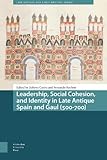Leadership, Social Cohesion, and Identity in Late Antique Spain and Gaul (500-700) / ed. by Fernando Ruchesi, Dolores Castro.
Material type: TextSeries: Late Antique and Early Medieval Iberia ; 11Publisher: Amsterdam : Amsterdam University Press, [2023]Copyright date: ©2023Description: 1 online resource (282 p.)Content type:
TextSeries: Late Antique and Early Medieval Iberia ; 11Publisher: Amsterdam : Amsterdam University Press, [2023]Copyright date: ©2023Description: 1 online resource (282 p.)Content type: - 9789048553778
- 946.01 23/eng/20230207
- online - DeGruyter
| Item type | Current library | Call number | URL | Status | Notes | Barcode | |
|---|---|---|---|---|---|---|---|
 eBook
eBook
|
Biblioteca "Angelicum" Pont. Univ. S.Tommaso d'Aquino Nuvola online | online - DeGruyter (Browse shelf(Opens below)) | Online access | Not for loan (Accesso limitato) | Accesso per gli utenti autorizzati / Access for authorized users | (dgr)9789048553778 |
Frontmatter -- Table of Contents -- Introduction -- 1. Building Leadership, Forging Cohesion: Bishops and Charity in Late Antiquity -- 2. The Logic of Control: Postulating a Visigothic Ontology of Human Being -- 3. Ritual Communities and Social Cohesion in Merovingian Gaul -- 4. Constructing New Leaders: Bishops in Visigothic Hispania Tarraconensis (Fifth to Seventh Centuries) -- 5. Coexisting Leaderships in the Visigothic Cities: A ‘Coopetitive’ Model -- 6. Leadership and Social Cohesion in Merovingian Gaul and Visigothic Spain : The Case of Military Groups -- 7. Between Rome and Toulouse : The Catholic Episcopate in the regnum Tolosanum (418–507) -- Index
restricted access online access with authorization star
http://purl.org/coar/access_right/c_16ec
The replacement of the Roman Empire in the West with emerging kingdoms like Visigothic Spain and Merovingian Gaul resulted in new societies, but without major population displacement. Societies changed because identities shifted and new points of cohesion formed under different leaders and leadership structures. This volume examines two kingdoms in the post-Roman west to understand how this process took shape. Though exhibiting striking continuities with the Roman past, Gaul and Spain emerged as distinctive, but not isolated, political entities that forged different strategies and drew upon different resources to strengthen their unity, shape social ties, and consolidate their political status.
Mode of access: Internet via World Wide Web.
In English.
Description based on online resource; title from PDF title page (publisher's Web site, viewed 06. Mrz 2024)


